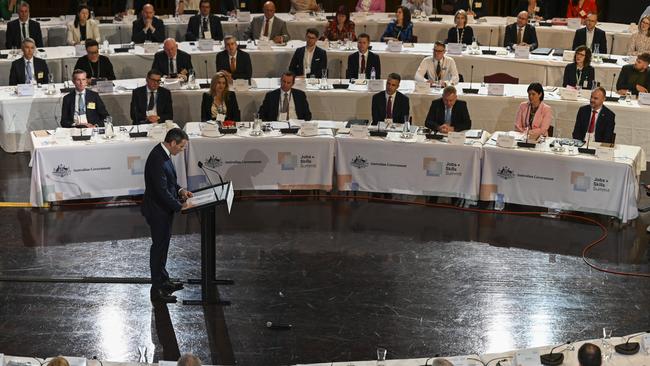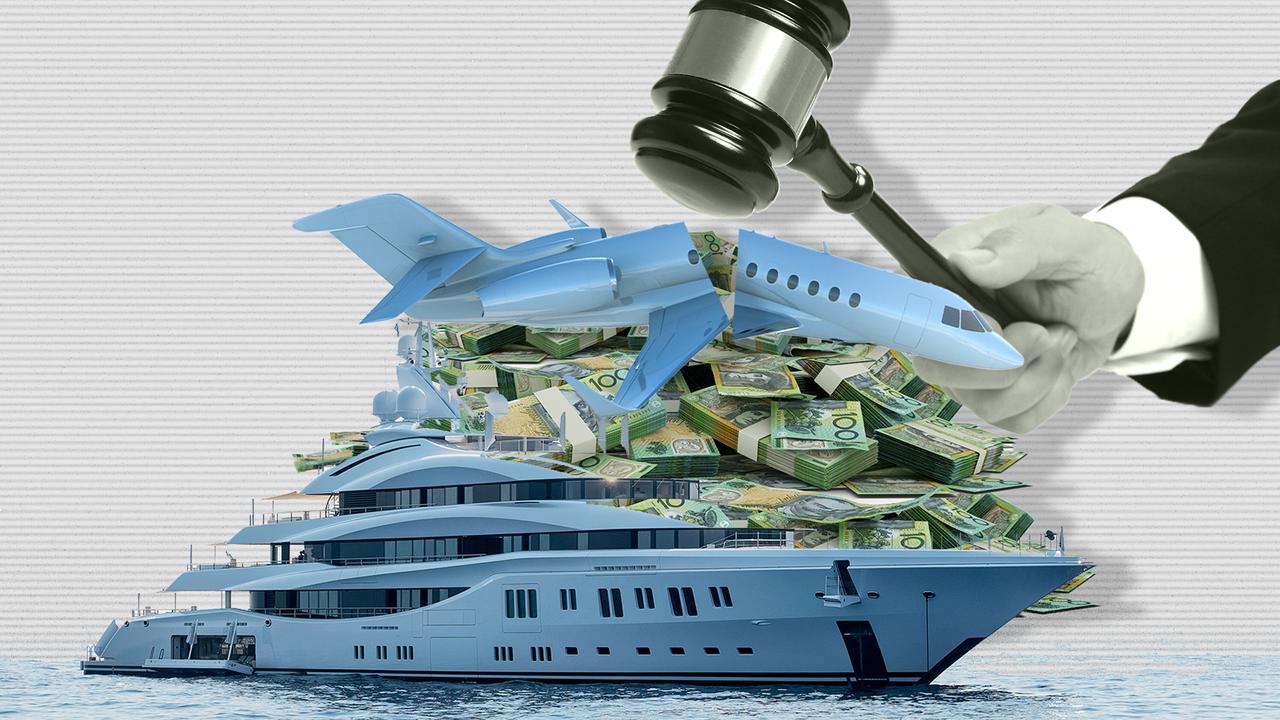Memo to Jim Chalmers: Settling old political scores won’t fix debt
Describing the total quantum of $1 trillion as ‘Liberal Party debt’ may be good politics, but it’s fiscally inaccurate.

Jim Chalmers is fond of referring to the national debt that the Labor government has inherited as “Liberal Party debt” – all $1 trillion of it. In fact even gross debt is currently less than that figure, although it is forecast to top the trillion-dollar mark soon enough.
You can slice roughly a quarter off the total debt burden if you just look at net debt, which is arguably the better marker anyway. But let’s not quibble, shall we? Describing the total quantum of debt as Liberal Party debt is good politics, even if it’s fiscally inaccurate. And not simply just because it’s national government debt.
In political terms the former Coalition government didn’t inherit no debt when it came to power in 2013. At that point gross debt was already around $250bn, largely courtesy of global financial crisis spending by the Rudd government shortly after it came to power.
Which is not to criticise Labor for what at the time was big spending in the wake of the global recession Australia avoided. The Coalition in opposition agreed with much (though not all) of the spending, and arguably the spending that occurred saved jobs and stimulated economic growth, helping us avoid recessionary effects. Chalmers would know this; he was chief of staff for the treasurer at the time, Wayne Swan.
Kevin Rudd won office when net debt was zero and gross debt was only slightly above the $50bn mark. It was the first time in 30 years an incoming government inherited “no net debt”, as Peter Costello and John Howard liked to describe it.
Which is not necessarily a compliment. To achieve the net debt position it did, the Howard government sold government assets it arguably never should have. And a case can be made that debt-funded infrastructure spending would have lifted sagging productivity, then and now, had the conservatives chosen such a policy course.
These are debates for economists, noting that partisans will never agree objective truths can be found. Nonetheless, it is extraordinary to think that in less than 30 years we will have gone from no debt to well over $1 trillion of it, which translates into a sizeable debt to GDP ratio. We certainly aren’t outgrowing our debt, and interest rates are on the rise.
What the Liberals in opposition can’t escape is the fact debt ballooned on their watch. Of course, they claim they were in the process of turning around the debt year-on-year before the pandemic struck, coming agonisingly close to handing down a surplus budget in 2019. Nevertheless they doubled the debt they inherited before Covid-19 arrived and doubled it again on the back of pandemic spending.
It no doubt frustrates the newly minted opposition that the likes of Chalmers now lampoon it for saddling the nation with so much debt when there was very little spending during the pandemic that Labor opposed. In fact on most policy fronts Labor wanted the Coalition to go further than it did: spend more and thus balloon the debt burden even further.
Guess what? It doesn’t really matter. Not politically at least. The government of the day makes its decisions and it must own those decisions for better or worse. The opposition gets little credit when it supports good decisions, so why should it share the blame for the bad ones?
Which is not to suggest pandemic spending levels necessarily represented bad decision-making. Perhaps some of it was, but the point is that politically the Coalition appears set to receive what it successfully dished out for decades after the defeat of the Keating government in 1996.
Because Paul Keating lost office as debt was rising and the budget was in deficit, the Coalition painted Labor as economic vandals and the public bought into the lie. Never mind that the outgoing Labor government was the most economically reforming national government in Australian history, setting up the prosperity we have enjoyed ever since. A prosperity now under threat, by the way, because governments since that time have inadequately reformed.
I’ll give the Howard government a leave pass on that criticism because of its first wave of industrial relations reforms and the introduction of the GST. But that was done and dusted by the beginning of the century. If Labor doesn’t take up the reforming challenge this term Australia will have missed out on meaningful economic reforms (because the few we’ve seen have been repealed in defeat) for a quarter of a century.
Like it or not the Morrison government lost as debt was rising and the budget was in deficit. So too all the forward estimates, by the way, which gives Labor the opportunity it needs to undo the decades-long narrative that the Coalition is the better economic manager.
The fact almost nine years of Coalition government under Tony Abbott, Malcolm Turnbull and Scott Morrison did virtually nothing of substance when it came to economic reforms makes the argument the Treasurer is mounting only more politically palatable.
But Labor doing anything meaningful on the economic reform front this term also seems unlikely. It promised a small number of marginal reforms during the campaign – regarding childcare, for example – but nothing that comes close to the heady reforms achieved in the 1980s and ’90s.
Were the new government to suddenly embark on major economic reforms it would be accused of breaking its implicit election promise to do nothing. The unintended consequence of a small-target strategy – unless it develops reform ideas this term and takes them to the next election, legislating them only if it wins.
That would represent a sound political strategy, but to do so it needs to back the Coalition into an economic corner as a failure during its last stint in government. Hence the rhetoric we are hearing from Chalmers. Labor also needs to find a way to pass such reforms through the Senate if it wins a second term.
Because the Coalition found itself in charge when the pandemic struck, like it or not it was responsible for Treasury when spending hit multiples never seen before, when national debt skyrocketed, including as a percentage of GDP, which really is the better indicator.
We need a proper debate about how to rebuild the tax system for the 21st century; shifting income taxes towards wealth taxes, for example. We also need to engage seriously with what sort of government we want and how far we want its responsibility to stretch. The welfare state continues to grow, which is fine as long as that is what the people want. But its exponential growth requires greater government efficiencies elsewhere and likely also requires higher taxation levels – none of which is possible without federation reform.
Such debates – hopefully leading to outcomes – is the serious work of government, beyond the “what goes around comes around” rhetoric both sides deploy for political advantage.
Peter van Onselen is professor of politics and public policy at the University of Western Australia and Griffith University.



